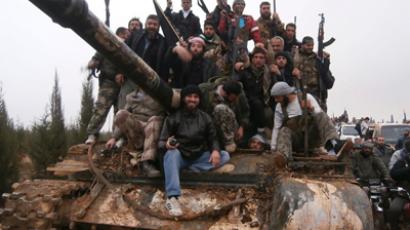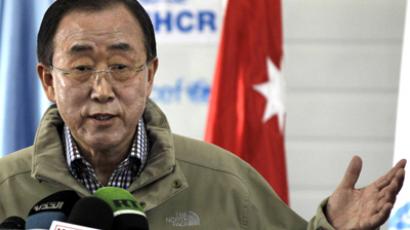Grisly video allegedly shows Syrian rebels forcing child to behead unarmed prisoner

A graphic video recently posted to YouTube allegedly shows Syrian rebels forcing a child to behead an unarmed prisoner. A recent series of similarly brutal incidents has done little to dampen foreign calls to arm the Syrian opposition.
The video shows a child hacking an alleged prisoner’s head off with a machete. Militants then hold up a severed head while chanting "Allahu Akbar," or “God is great.”It is the latest in a string of especially grisly incidents which have become more common in recent months. On Monday, rebels killed 13 soldiers during an ambush of an army unit in a strategic northern town, activists reported.Syrian warplanes later bombed the town, the Syrian Observatory for Human Rights said.Both sides have played a role in the deaths of over 40,000 people since the uprising against President Bashar Assad began in March 2011.
Secret supply operation
As the atrocities continue to build on Syrian soil, the US seems intent on supplying the rebels with weapons. Washington is reportedly launching a covert operation to send weapons to the Syrian opposition for the very first time. According to diplomatic sources, the US will send mortars, rocket-propelled grenades and anti-tank missiles to Syria through Middle Eastern countries that are already supplying the rebels, The Sunday Times reported.Many of the weapons, including SA-7 missiles, which can shoot down planes, were purchased from the stockpiles of former Libyan leader Muammar Gaddafi. The Times reports that the White House made the decision following reports of movements at Syria’s chemical weapons sites. Western governments say they are ready to intervene in case of a chemical threat, but Politics First editor Marcus Papadopoulos says those statements require the international community to be on guard. “It could be a pretext that the West – principally America – is using the [chemical weapons threat] to intervene in Syria. I think Western military intervention is probably not going to happen, but we should be on guard. They did it in Kosovo, and they did it in Iraq and Libya,” he told RT. President Barack Obama authorized undercover CIA support earlier this year, and has placed special forces and intelligence officers on the ground in Syria. However, the country has until now refused to provide arms to the rebels.Last Month, Secretary of State Hillary Clinton called for a re-shaping of the Syrian opposition’s leadership, bringing the formation of the National Coalition for Syrian Revolutionary and Opposition Forces.The creation of the new group eased some worries that the weapons would fall into the wrong hands. Clinton is scheduled to attend a Friends of Syria meeting in Morocco on Wednesday, where the US is expected to recognize the group as the legitimate representative of the Syrian people.However, the Washington remains concerned about Jabhat-al-Nusra, a Syrian jihadi group it plans to classify as a terrorist organization. Opposition leaders say the group has been welcomed by the rebels because of its financial and military contributions, and as such have urged the US to delay the listing. The allied relationship between the group and the Syrian opposition forces has many worried that the weapons will be used to carry out unnecessary violence. Syria’s opposition and its Gulf backers are expected to press other Western governments for supplies this week, arguing that significant progress has been made to unify armed groups and bring them under control, the Financial Times reported.Qatar and Saudi Arabia are currently the main suppliers of military equipment to Syria’s armed opposition. However, diplomats say rebels need greater amounts of arms – some of which must be provided by Western countries.Britain, which recently pledged over $40 million in humanitarian aid to Syria, is expected to provide body armor to the rebels, but has no plans to provide weapons. British Foreign Secretary William Hague says the UK’s policy is to provide “non-lethal assistance” to the opposition.














